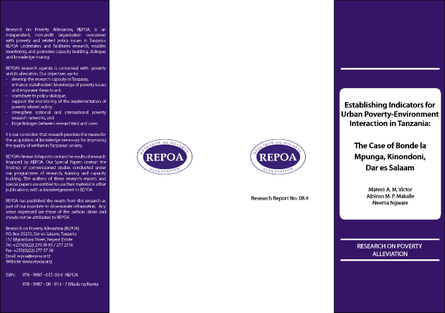
The premise for this study is that urban development and espeically livelihood opportunities for the urban poor are, in most cases, limited by adverse environmental conditions created by growing centers of population and activity. The various individual and collective human activities that contribute to urban development have numerous positive and negative envrionmental consequences. However, the degree and direction of causality between processes of impoverishment on the one hand, and the processes of environmental change or degradation on the other hand, in urban settings in Tanzania, has not been closely examined or widely covered in existing literature. In view of this research gap, the study focused on community responses to environmental change at a mciro-level to understand and describe the links between poverty and the environment (i.e. poverty-environment interactions).
Resource collections
- ALNAP focus topics
- Climate emergency
- Locally led humanitarian action
- UN Habitat - Urban Response Collection
- Urban Response - Urban Crisis Preparedness and Risk Reduction
- Urban Response Collection - Community Engagement and Social Cohesion
- Urban Response Collection - Economic Recovery
- Urban Response Collection - Environment and Climate Change
- Urban Response Collection - Housing, Land and Property
- Urban Response Collection - Urban Crisis Response, Recovery and Reconstruction
- Urban Response Collection - Urban Resilience